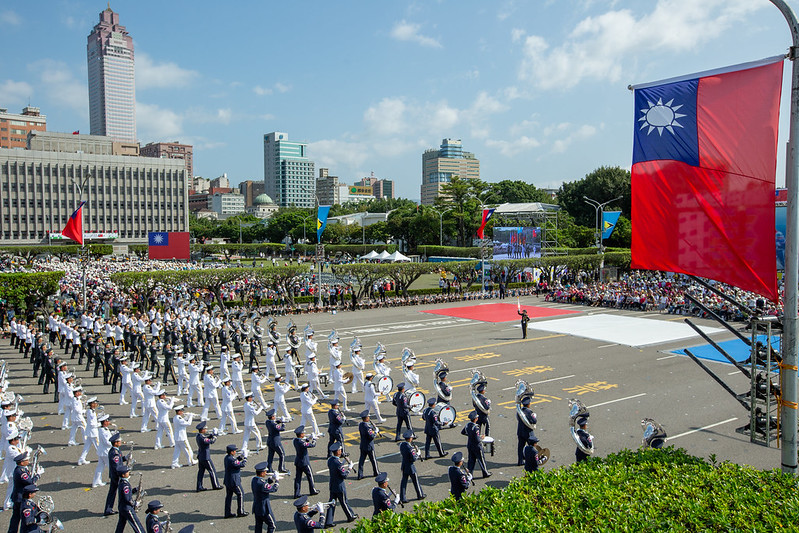What is conveyed in the lament, agony, and actions of the Taiwanese people is not exclusionary violence, but different ways of belonging and of imaging a common future.
In his obituary to his friend, world renowned political theorist and historian Benedict Anderson, Taiwanese political theorist Wu Rwei-ren explains his dilemma in advocating for independence of Taiwan from a leftist standpoint. In his experience, no matter how leftist your social policies are, how progressive your ethnic policies are, or how pluralist your gender policies are, within a certain international leftist configuration, as soon as you mention Taiwan independence, you become a conservative right-wing. According to him, this “progressive left-wing” has “completely erased the historical efforts of the Taiwanese to fight for self-determination, to pursue noble values such as freedom, equality and pluralism over the past hundreds of years, and denied Taiwanese peoples’ relation to the world and the possibility of them contributing their experiences of struggling to realize universalistic and progressive values to the world. This prejudice not only erased a precious gift that is common to the humankind, but also prohibited a progressive solidarity that would contribute to the common future of the humankind from being formed.” (Wu 2015, author’s translation).
But is “left-wing Taiwanese independence” actually an oxymoron? Under such profound prejudice and erasure, is it possible to articulate a Taiwanese nationalism that, indeed, practices and actualizes progressive values such as freedom, equality, plurality, inclusion, and justice?
It is certainly the case that the concept of nationalism, and especially nationalist sovereignty, has been widely critiqued and discredited as a progressive political imaginary. For many political theorists, modern nationalist sovereignty necessarily evokes the violent exclusionary logic of “blood and soil” that is often associated with xenophobia and white supremacy. However, as Wu acknowledges, such criticism tends to ignore the concrete struggles on the ground. As a result, such ad hoc critiques ironically reproduce the epistemological and political violence that deny the political agency of colonized and subaltern peoples. Indigenous thinkers and activists, writing about anti-colonial struggles for national self-determination in North America, share Wu’s critique and concern. Mohawk anthropologist Audra Simpson, for example, argues that Mohawk nationalist sovereignty matters, and it manifests itself in a collective refusal to be incorporated into the Canadian and U.S. state as liberal rights-bearing individuals and turning away from statist forms of recognition.
These examples show that sovereignty is crucial in forging a progressive, anti-colonial political imaginary. The continuous existence of empires and imperial claims to contested or occupied territory and colonized peoples in an age that is often characterized by post-coloniality testifies to the challenge of rearticulating nationalist sovereignty. This decolonized nationalist sovereignty must, on the one hand, prevent a collective community from being subsumed or erased by empire, and on the other hand, avoid previous violence produced by the monolithic logic of national self-determination that paradoxically, erases questions of difference within the bounded community.
This decolonized nationalist sovereignty must, on the one hand, prevent a collective community from being subsumed or erased by empire, and on the other hand, avoid previous violence produced by the monolithic logic of national self-determination that paradoxically, erases questions of difference within the bounded community.
Just as members of the Mohawk Nation practice sovereignty that is clearly different from the settler-colonial empires that claim them, Taiwanese people’s past and ongoing struggle for independence and self-determination is also drastically different from the imperial and colonial measures China has undertaken to violently silence and bully them. In a highly predictable manner, China and Chinese individuals have strived to punish, threat and silence any affirmation or mention of Taiwanese sovereignty. For example, during Taiwan’s 55th Golden Horse Film Awards, Fu Yue, who received the best documentary award, said in her speech that “I hope my country will one day be recognized as an independent entity, this is my biggest wish as a Taiwanese.” This remark was met by enduring applause from the audience, but evoked hate speech and bullying from the Chinese public. The live broadcast of the ceremony in China was reportedly cut off during Fu’s speech. At the same time, China has been forcing Taiwanese individuals who work in China to apologize for referring to Taiwan as a country, the recent example being Taiwanese actress Vivian Sung, who in a previous video had said that her favorite country is Taiwan.
It is clear that for China, nationalist sovereignty is manifested in continuously lying phantasmatic claims to a territory that actually is governed by a foreign political body, and denying Taiwanese people’s sense of belonging, integrity and identification. China also often paradoxically mobilizes an anti-colonial and anti-imperial language that criticizes “Western powers from intervening in China’s sovereignty” to lay colonial and imperial claims on Taiwan. Seen from this angle, nationalist sovereignty is indeed a dangerous tool. However, as Wu and Simpson have shown, nationalist sovereignty does not have to be articulated this way. Indeed, Taiwanese people’s struggles against double colonization — one the one hand by what some would argue is the settler colonial state of the Republic of China, on the other hand the imperialist state of People’s Republic of China — have always been articulated in terms of gender and sexual equality and equity — the results of recent referenda regarding same-sex marriage show there is still a long long way to go, racial justice especially for indigenous peoples of Taiwan, better labor conditions, fairer (re)distribution, land justice, environmental justice, and so on.
The Taiwanese struggle for sovereignty and independence should be understood explicitly as an anti-colonial and anti-imperial struggle. Nationalist sovereignty, in this case, should be understood as the condition of possibility for realizing these various kinds of progressive political struggles. It is an affective attachment that continuously acknowledges a particular way of being together in a bounded and shared space. What comes to be conveyed in its lament, agony, and action is not exclusionary violence, but many different ways of belonging and different ways of imaging a common future. When Fu Yue says that her biggest wish as a Taiwanese is for her country to be recognized as an independent entity, when Vivian Sung says her favorite country is Taiwan, what they articulate is a sense of belonging, an affective attachment to a particular way of being-in-the-world, in a shared space, with people that she identifies as her fellow citizens.
You might also like
More from Taiwan Politics
President Tsai’s Second Term and Cross-Strait Relations: What to Watch Out For
The next four years will be marked by uncertainty over China’s trajectory and the state of the world in the …
Above All, The Legitimacy of Taiwan’s Democracy
Since democratization, the main political parties in Taiwan have agreed to rules of the game which have served to legitimize …
Trouble in the Blue Camp
Within a matter of months, Han the savior has turned into a liability, and a bit of an embarrassment, for …









